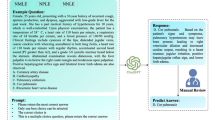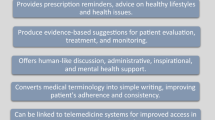Abstract
ChatGPT, a language model developed by OpenAI, uses a 175 billion parameter Transformer architecture for natural language processing tasks. This study aimed to compare the knowledge and interpretation ability of ChatGPT with those of medical students in China by administering the Chinese National Medical Licensing Examination (NMLE) to both ChatGPT and medical students. We evaluated the performance of ChatGPT in three years' worth of the NMLE, which consists of four units. At the same time, the exam results were compared to those of medical students who had studied for five years at medical colleges. ChatGPT’s performance was lower than that of the medical students, and ChatGPT’s correct answer rate was related to the year in which the exam questions were released. ChatGPT’s knowledge and interpretation ability for the NMLE were not yet comparable to those of medical students in China. It is probable that these abilities will improve through deep learning.

Similar content being viewed by others
Data availability
Supporting data are available upon request after publication.
References
Shen Y, Heacock L, Elias J, Hentel KD, Reig B, Shih G, Moy L. ChatGPT and Other Large Language Models Are Double-edged Swords. Radiology. 2023 Jan 26:230163. https://doi.org/10.1148/radiol.230163.
Biswas S. ChatGPT and the Future of Medical Writing. Radiology. Feb 2 2023 :223312. https://doi.org/10.1148/radiol.223312
Wang S, Scells H, Koopman B, Zuccon G. Can ChatGPT Write a Good Boolean Query for Systematic Review Literature Search? arXiv. Preprint posted online on 3 Feb 2023. https://doi.org/10.48550/arXiv.2302.03495
Guo B, Zhang X, Wang Z, Jiang M, Nie J, Ding Y, Yue J, Wu Y. How Close is ChatGPT to Human Experts? Comparison Corpus, Evaluation, and Detection. arXiv. Preprint posted online on 18 Jan 2023. https://doi.org/10.48550/arXiv.2301.07597
King, M.R. The Future of AI in Medicine: A Perspective from a Chatbot. Ann Biomed Eng 51, 291–295 (2023). https://doi.org/10.1007/s10439-022-03121-w
Das A, Selek S, Warner AR, Zuo X, Hu Y, Keloth VK, Li J, Zheng WJ, Xu H. 2022. Conversational Bots for Psychotherapy: A Study of Generative Transformer Models Using Domain-specific Dialogues. In Proceedings of the 21st Workshop on Biomedical Language Processing, pages 285–297, Dublin, Ireland. Association for Computational Linguistics. https://doi.org/10.18653/v1/2022.bionlp-1.27
Mijwil M, Aljanabi M, Ali AH. (2023). ChatGPT: Exploring the Role of Cybersecurity in the Protection of Medical Information. Mesopotamian Journal of CyberSecurity, 2023, 18–21. https://doi.org/10.58496/MJCS/2023/004
Bommarito J, Bommarito M, Katz DM, Katz J. GPT as Knowledge Worker: A Zero-Shot Evaluation of (AI)CPA Capabilities. arXiv preprint posted online on 11 Jan 2023 https://doi.org/10.48550/arXiv.2301.04408
Bommarito II M, Katz DM. GPT Takes the Bar Exam. arXiv preprint posted online on 29 Dec 2022. https://doi.org/10.48550/arXiv.2212.14402
Gilson A, Safranek CW, Huang T, et al. How Does ChatGPT Perform on the United States Medical Licensing Examination? The Implications of Large Language Models for Medical Education and Knowledge Assessment. JMIR Med Educ. 2023 Feb 8;9:e45312. https://doi.org/10.2196/45312
Huh S. Are ChatGPT’s knowledge and interpretation ability comparable to those of medical students in Korea for taking a parasitology examination?: a descriptive study. J Educ Eval Health Prof. 2023;20:1. https://doi.org/10.3352/jeehp.2023.20.1
Xiancheng Wang. Experiences, challenges, and prospects of National Medical Licensing Examination in China. BMC Med Educ. 2022 May 8;22(1):349. https://doi.org/10.1186/s12909-022-03385-9
Hacker P, Engel A, Mauer M. Regulating ChatGPT and other Large Generative AI Models. arXiv. Preprint posted online on 10 Feb 2023. https://doi.org/10.48550/arXiv.2302.02337
Kung TH, Cheatham M, Medinilla A, Sillos C, De Leon L, Elepano C, et al. Performance of ChatGPT on USMLE: Potential for AIAssisted Medical Education Using Large Language Models. medRxiv 2022.12.19.22283643. https://doi.org/10.1101/2022.12.19.22283643
Jeblick K, Schachtner B, Dexl J, Mittermeier A, Stüber AT, Topalis J, Weber T, Wesp P, Sabel B, Ricke J, Ingrisch M. ChatGPT Makes Medicine Easy to Swallow: An Exploratory Case Study on Simplified Radiology Reports. arXiv preprint posted online on 30 Dec 2022. https://doi.org/10.48550/arXiv.2212.14882
Gao CA, Howard FM, Markov NS, Dyer EC, Ramesh S, Luo Y, et al. Comparing scientific abstracts generated by ChatGPT to original abstracts using an artificial intelligence output detector, plagiarism detector, and blinded human reviewers.bioRxiv 2022.12.23.521610. https://doi.org/10.1101/2022.12.23.521610
Jeblick K, Schachtner B, Dexl J, Mittermeier A, Stüber AT, Topalis J, et al. ChatGPT Makes Medicine Easy to Swallow: An Exploratory Case Study on Simplified Radiology Reports. arXiv preprint posted online on30 Dec 2022. https://doi.org/10.48550/arXiv.2212.14882
Funding
The work received no external funding.
Author information
Authors and Affiliations
Contributions
WXY and LXY conceived and designed the study, developed the study protocol, statistical analyses and wrote the manuscript. WGX, JJD, XY, ZJL, FQY, and SW encoded and input the data into ChatGPT. GZY and HWG performed quality control, and statistical analyses.
Corresponding author
Ethics declarations
Ethical approval
This was not a study of human subjects, but an analysis of the results of an educational examination routinely conducted. Therefore, neither receiving approval from the institutional review board nor obtaining informed consent was required.
Competing interests
The authors declare that there is no conflflict of interest regarding the publication of this paper.
Additional information
Publisher's Note
Springer Nature remains neutral with regard to jurisdictional claims in published maps and institutional affiliations.
Rights and permissions
Springer Nature or its licensor (e.g. a society or other partner) holds exclusive rights to this article under a publishing agreement with the author(s) or other rightsholder(s); author self-archiving of the accepted manuscript version of this article is solely governed by the terms of such publishing agreement and applicable law.
About this article
Cite this article
Wang, X., Gong, Z., Wang, G. et al. ChatGPT Performs on the Chinese National Medical Licensing Examination. J Med Syst 47, 86 (2023). https://doi.org/10.1007/s10916-023-01961-0
Received:
Accepted:
Published:
DOI: https://doi.org/10.1007/s10916-023-01961-0




